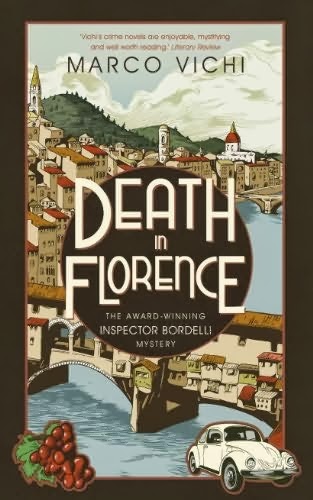I have always been quite a fan of the crime genre, not the crap out there by writers such as Martina Cole, Lisa Gardner and Karen Rose, but quality stuff from the likes of Stieg Larsson and Gillian Flynn. But I have gone off it recently, so after reading quite a different variety of books, I thought I would slip back into some crime novels. Searching through the charity books, I discovered two books by Marco Vichi. Both of the titles had 'Death' in the title so that heavily denoted crime. Not only this, but flicking through the blurbs, they are both set in Florence, Italy. One of my favourite cities. The Italian in me (only half a person mind) added them to the bottom of the pile.
Both of these books are from a series of novels featuring the veteran war hero turned policeman Inspector Bordelli. The first novel in the series, Death In August, is our first look at the character of Inspector Bordelli. An extremely complex character, he is the stereotypical Italian man. Can't keep a woman, eats far too much and smokes even more. He is rather unlikable which made the first book extremely difficult to read. The plot centres around the mysterious death of a local rich lady. It is classic Agatha Christie, with plenty of red herrings and a seemingly obvious explanation for everything in the end. There is even the classic big reveal at the end. But Vichi doesn't quite pull it off. It all feels rather rushed and awkward. Perhaps it was just a bad translation. It was the first book in awhile that I nearly didn't bother finishing, the last being one of Martina Cole's latest tripe.

Putting a book distance between the first novel and one of the later books in the series Death In Florence, I was quite reluctant to read it after my previous read. I decided to give it a go and was pleasantly surprised. Being a much longer book, it felt like Vichi had given it more time to play out and not feel as speedy. Centreing on the death of a young boy who is found buried in the woods, there is a much greater sense of plot throughout. There is a passage later in the book that is quite uncomfortable to read, where we learn about the death of a boy, involving a sex game with a group of old Fascists that has been going on for years. But then if no-one wrote about stuff like this, we wouldn't know it happens.
One thing that Vichi does extremely well is surrounding the unlikable Inspector Bordelli with intriguing characters. Many of them are ex- convicts that he has let off, or even an old prostitute he has a close friendship with. It helps to add much more depth to the plot, as well as Bordelli himself, learning about his character through how he interacts with them.
Death In Florence is a much easier read, with many of the Christie cliches stripped away. It almost loses it in the middle of the book when Florence floods and the investigation takes a back seat. Whilst this may be realistic, it only hinders in the storytelling and becomes slightly mundane after awhile. I did read this in the midst of the flooding in Surrey near my house so maybe I was just sick of high tides.
 |
| The height of the Florence 1966 floods depicted in Death In Florence |
So if you a fan of crime, I would certainly give them a go. The first book is so short that it is almost worth reading just to be introduced the characters, so as to go on and be able to enjoy later books in the series. But did they make me fall in love with crime fiction again? That would have to be a no.
Both of these novels are published by Hodder and Stoughton in the UK.

.jpg)












.jpg)


